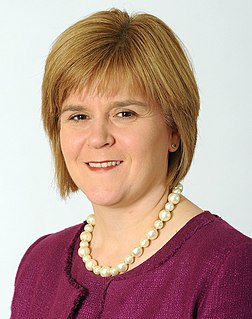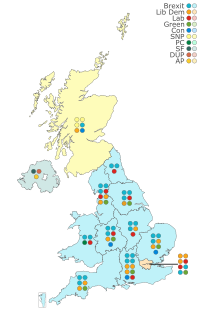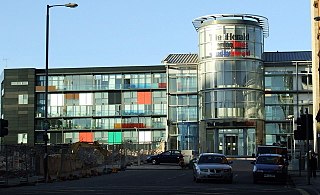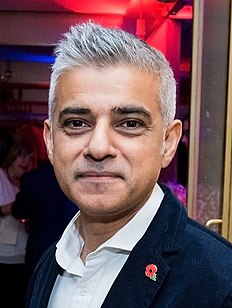
The United Kingdom European Communities membership referendum, also known variously as the Referendum on the European Community , the Common Market referendum and EEC membership referendum, took place under the provisions of the Referendum Act 1975 on 5 June 1975 in the United Kingdom to gauge support for the country's continued membership of the European Communities (EC) — often known at the time as the European Community and the Common Market — which it had entered two and a half years earlier on 1 January 1973 under the Conservative government of Edward Heath. Labour's manifesto for the October 1974 general election had promised that the people would decide through the ballot box whether to remain in the EC.

Euroscepticism, i.e. the opposition to policies of supranational European Union institutions and/or opposition to Britain's membership of the European Union, has been a significant element in the politics of the United Kingdom (UK). A Eurobarometer survey of EU citizens in 2009 showed that support for membership of the EU was lowest in the United Kingdom, alongside Latvia and Hungary.
The People's Pledge was a political campaign to secure a referendum on the United Kingdom's membership of the European Union. It aimed to achieve this by asking voters to sign a pledge that they would use their vote to help secure a majority of Members of Parliament (MPs) in support of an in-out referendum on EU membership. The 1975 European Communities membership referendum was the last time such a vote had occurred in Britain.

The United Kingdom's component of the 2014 European Parliament election was held on Thursday 22 May 2014, coinciding with the 2014 local elections in England and Northern Ireland. In total, 73 Members of the European Parliament were elected from the United Kingdom using proportional representation. England, Scotland and Wales use a closed-list party list system of PR, while Northern Ireland used the single transferable vote (STV).

The 2015 United Kingdom general election in Scotland was held on 7 May 2015 and all 59 seats were contested under the first-past-the-post electoral system. Unlike the 2010 general election, where no seats changed party, the Scottish National Party (SNP) won all but three seats in Scotland in an unprecedented landslide gaining a total of fifty-six seats and also become the first party in sixty years to win 50% of the Scottish vote. The Labour Party suffered its worst ever election defeat in Scotland, losing 40 of the 41 seats they were defending, including the seats of Scottish Labour Party leader Jim Murphy and the then Shadow Foreign Secretary Douglas Alexander. The Liberal Democrats lost ten of the eleven seats they were defending with the then Chief Secretary to the Treasury Danny Alexander and former leader Charles Kennedy losing their seats. The election also saw the worst performance by the Conservative Party, which received its lowest share of the vote since its creation in 1965, although it retained the one seat that it previously held. In all, 50 of the 59 seats changed party, 49 of them being won by first-time MPs.
The UK in a Changing Europe initiative is intended to improve access to research on the relationship between the UK and the European Union (EU). It is funded by the Economic and Social Research Council (ESRC), and is based at King's College London.

The European Union Referendum Act 2015(c. 36) is an Act of the Parliament of the United Kingdom that made legal provision for a pre-legislative referendum to be held in the United Kingdom and Gibraltar, on whether it should remain a member state of the European Union or leave it. The bill was introduced to the House of Commons by Philip Hammond, Foreign Secretary on 28 May 2015. Two weeks later, the second reading of the Act was supported by MPs from all parties except the SNP; the Act subsequently passed on its third reading in the Commons on 7 September 2015 and was approved by the House of Lords on 14 December 2015, and given Royal Assent on 17 December 2015 and came partly into force on the same day and came into full legal force on 1 February 2016.

The United Kingdom's component of the 2019 European Parliament election was held on Thursday 23 May 2019 and the results are to be announced on Sunday 26 May 2019 when all the other EU countries are expected to have voted.

Vote Leave was an organisation that campaigned for a "Leave" vote in the United Kingdom European Union membership referendum, 2016. On 13 April 2016 it was designated by the Electoral Commission as the official campaign in favour of leaving the European Union in the Referendum.

The referendum on EU membership took place on 23 June 2016. Opinion polling for the United Kingdom European Union membership referendum was ongoing in the months between the announcement of a referendum and the referendum polling day. Polls on the general principle of Britain's membership of the European Union were carried out for a number of years prior to the referendum. Opinion polls of voters in general tended to show roughly equal proportions in favour of remaining and leaving. Polls of business leaders, scientists, and lawyers showed majorities in favour of remaining. Among non-British citizens in other EU member states, polling suggested that a majority were in favour of the UK remaining in the EU in principle, but that a similarly sized majority believed that if the UK were only able to remain in the EU on renegotiated terms then it should leave.

Issues in the United Kingdom European Union membership referendum, 2016 are the economic, human and political issues that were discussed during the campaign about the withdrawal of the United Kingdom from the European Union, during the period leading up to the Brexit referendum of 23 June 2016. [Issues that have arisen since then are outside the scope of this article].

After the UK EU membership referendum held on 23 June 2016, in which a majority voted to leave the European Union, the United Kingdom experienced political and economic upsets, with spillover effects across the rest of the European Union and the wider world. Prime Minister David Cameron, who had campaigned for Remain, announced his resignation on 24 June, triggering a Conservative leadership election, won by Home Secretary Theresa May. Following Leader of the Opposition Jeremy Corbyn's loss of a motion of no confidence among the Parliamentary Labour Party, he also faced a leadership challenge, which he won. Nigel Farage stepped down from leadership of the pro-Leave party UKIP in July. After the elected party leader resigned, Farage then became the party's interim leader on 5 October until Paul Nuttall was elected leader on 28 November.

The result of the United Kingdom European Union Referendum of 2016 was a victory for the "Leave" campaign, amassing a total of 51.9% of the vote. This meant that the outcome was in favour of the United Kingdom leaving the European Union, a decision and process that is commonly referred to as "Brexit". Consequently, UK Prime Minister Theresa May triggered Article 50 on 29 March 2017, starting the process of British withdrawal from the European Union.

The European Union (Referendum) Bill 2013–14 was a private member's bill of the Parliament of the United Kingdom designed to make provision for a referendum on membership of the European Union to be held in 2017 following renegotiation of terms between the European Union and the United Kingdom government. The bill ceased to be considered by Parliament after January 2014 and did not become law. However, a subsequent bill with the same objective, the European Union Referendum Act 2015, was later introduced to the House of Commons by the newly elected Conservative government in May 2015 was passed and received royal assent on 17 December 2015.

A referendum on the Brexit withdrawal agreement, also referred to as a "second referendum" or a "people's vote", has been proposed by a number of politicians and pressure groups as a way to break the deadlock in Parliament surrounding the meaningful vote on the Brexit deal.










